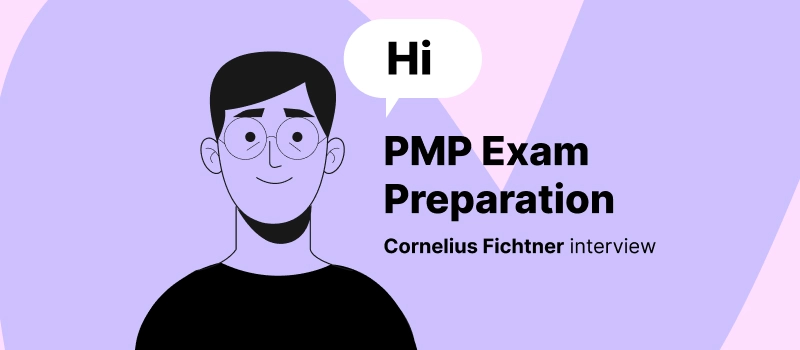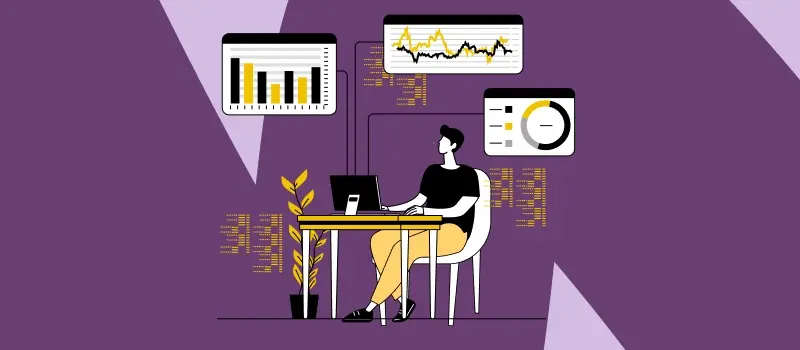
If you’ve ever considered taking the Project Management Professional (PMP) exam, you’re probably already familiar with the butterflies-in-the-stomach sensation just thinking about it.
This exam is infamous for its rigorous demands and comprehensive scope. And the idea of remembering all those process groups and knowledge areas may seem daunting, like trying to eat an elephant in one bite.
We asked Cornelius Fichtner, a seasoned project manager and author, how to better embrace the challenge and conquer this beast.
Let’s break it down!
Who Is Cornelius Fichtner?
Cornelius Fichtner is a name you might recognize if you’re delving into the world of project management. With a keen intellect and a knack for breaking down complex ideas, Cornelius has carved out a niche as a thought leader in the project management community.
He’s perhaps best known for his engaging and insightful podcasts, which have become a go-to resource for professionals looking to get a grip on the intricacies of project management.
Beyond this, his contributions through various platforms and courses have empowered countless individuals to achieve their PMP certification.
The approachable warmth to his teaching style makes the often-daunting world of project management both accessible and engaging, helping novices and seasoned professionals alike to thrive in their careers.
9 Important Questions About the PMP Exam
1. What are the most common challenges candidates face when preparing for the PMP exam?
Staying on top of the plethora of concepts – from risk management to stakeholder engagement – can feel a bit like juggling flaming swords. However, the overwhelming amount of information is not the only challenge you have to overcome while preparing for the exam.
What are the others?
Cornelius Fichtner:
“There are so many, it’s hard to choose. Here are my top 4:
- Over-reliance on memorization instead of understanding.
- Struggling to shift a waterfall mindset to agile frameworks.
- Misjudging time required for deep mock exams.
- Difficulty translating work experience into PMI language (more about that below in other answers).”
2. How does the complexity of the PMBOK Guide impact a candidate’s ability to pass the exam?
The PMBOK Guide has been both the best friend and nemesis of many aspiring project managers. Its complexity often feels like a mind-boggling maze. And for candidates eyeing the PMP exam, this complexity can be daunting.
However, the PMBOK Guide is not the monster it’s often made out to be.
Cornelius Fichtner:
“This is a normal misconception. The PMP Exam is NOT a test of the PMBOK Guide. Instead, it is based on the PMP Exam Content Outline, a relatively short document that outlines the syllabus of the PMP Exam.
The PMBOK Guide is just one of about a dozen reference books that PMI lists on its website. All of these books are used by PMI when they develop questions as the primary or secondary reference to substantiate the question and its correct answer.
So, the problem isn’t the complexity of the PMBOK Guide but the fact that there are so many reference books, and as a candidate, you need a wide and deep knowledge of project management to identify the correct answer.”
3. What role does hands-on project management experience play in successfully passing the PMP exam?
Many of the questions on the exam are designed to test not just your understanding of concepts, but your ability to apply them, often requiring a quick recall of how you’ve handled similar situations in the past.
So, how much can professional experience help answer them?
Cornelius Fichtner:
“Quite a lot. But it has to be ‘the right’ type of experience.
In the past, the PMP exam was a rather ‘theoretical’ exam. PMI has addressed this in the last few years by changing most of the questions from knowledge-based questions to scenario-based questions. This means that most questions on the current PMP exam will present you with a short scenario and then ask, ‘What should the PM do next?’, ‘What could the PM have done to avoid this?’, all intended to test how you would react.
But of course, PMI has a specific way of doing projects that it sees as ‘the best’. Many refer to this as The PMI Mindset. This means that if your experience in managing projects matches the style and approach that PMI considers to be ‘correct’, then you are more likely to find the exam somewhat easier because you have The PMI Mindset.”
4. What specific skills or knowledge gaps do you often see in candidates who struggle with the PMP exam?
The PMP exam requires you to navigate through a jungle of scenarios where your ability to manage limited resources, handle stakeholder expectations, and ensure project goals align with the bigger picture is constantly tested.
It’s not surprising that some people struggle with passing it. But why exactly?
Cornelius Fichtner:
“A colleague of mine used to say ‘The PMP Exam is one mile wide, but only one inch deep’. Therefore, exam takers simply need a ‘vast’ knowledge of project management. On the exam, pretty much any scenario in any type of project using any type of methodology can (theoretically) appear. So, the sheer volume of what you need to be aware of and know about can be overwhelming.
Often, however, the bigger issue is to translate your experience combined with the PMP exam prep training and use this to identify the correct answer.
I’m currently helping one of my students who struggles with this. He has already studied for nearly a year, but even though he understands the material in theory and practice, he struggles to identify the correct answer on his exams.”
5. How do practice exams and mock tests contribute to a candidate’s readiness for the actual PMP exam?
Practice exams and mock tests are like a dress rehearsal for the big day! When you dive into these practice sessions, you’ll uncover areas that might need a little more love and attention, allowing you to hone your skills and strategies ahead of time.
So, how big is their role in your overall success?
Cornelius Fichtner:
“If you do not have a PMP exam simulator, you will most likely fail your exam.
In fact, here is what I recommend to my students in a recent YouTube video: don’t read the PMBOK Guide… instead use a PMP exam simulator to answer as many sample questions as you can and only open your books when a topic from a question seems unfamiliar and you want to study up on it.”
6. What strategies do you recommend for managing time effectively during both the preparation phase and the exam itself?
We’ve all been there – staring at a wall of text the night before an exam, feeling overwhelmed, and wishing we could freeze time. But breaking your prep into manageable chunks and setting up a study schedule is a great way to such situations.
How can you do that?
Cornelius Fichtner:
“Once again, this is where a good exam simulator comes in: you want one that closely mimics the actual exam environment… which means 180 questions in 230 minutes. And if you do as many of these complete exams as you can, then the real exam will seem ‘just like another practice exam’.
This is similar to preparing for a sporting event: you practice the same sport again and again so that when you go to the meet your muscle memory kicks in and you pass with flying colors.”
7. How can training providers support candidates in developing critical thinking skills necessary for answering situational questions on the exam?
When it comes to preparing for exams, mastering critical thinking skills is essential, especially for those tricky situational questions that can seem more like riddles than anything else. That’s where top-notch training providers step in.
Cornelius Fichtner:
“They can teach candidates the PMI Mindset. This is probably the most crucial aspect of the exam. If a student understands how PMI ‘thinks’, then identifying the correct answer becomes more natural and somewhat easier.”
8. What resources (books, online courses, etc.) do you recommend for comprehensive PMP exam preparation?
Mixing up multiple learning resources can make your study sessions both productive and interesting, setting you on a steady path to achieving your PMP certification.
What are the most helpful ones?
Cornelius Fichtner:
“Start with the PMP Exam Content Outline – it’s the blueprint for your exam.
- Enroll in a PMP exam prep course that teaches directly from this outline. In this way, you can be sure that the topics covered are exam-relevant
- Practice with a PMP exam simulator to master your knowledge and train yourself for the exam.
- Open your books only for those topics where you feel you need more studying.
- Repeat 3 and 4 until your exam day.”
9. What post-exam strategies do you suggest for candidates who may not pass on their first attempt?
Taking the PMP exam can be quite an adventure, like climbing a high mountain with unpredictable conditions. Some folks might not reach the summit on their first attempt, and that’s perfectly okay.
What can you do to get the courage to try again?
Cornelius Fichtner:
“This is discussed in my most recent YouTube video about the PMP exam: ‘I Failed My PMP Exam – Now What??’. My argument is that most students don’t really need more training and studying. They did enough of that and then were unlucky to fail their exam. I recommend the following three actions:
- Review your PMP exam report to identify weak areas across the People, Process, and Business Environment domains. In this way you understand where your weak areas are.
- Focus on mastering question analysis by watching videos and joining live study groups to sharpen your skills. This will help you analyze exam questions, learn the PMI Mindset, and hone your skill in identifying the correct answers.
- Now you want to leverage your PMP exam simulator by taking practice quizzes and thoroughly reviewing incorrect answers to bridge knowledge gaps.”
Conclusion
In the end, it’s clear that mastering the nuances of PMP exam preparation involves more than just memorizing facts. It’s about embracing the mindset of a project manager, understanding the ebb and flow of projects, and applying theoretical knowledge to real-world scenarios.
Bridging the gap between studying and doing, Cornelius Fichtner emphasizes the importance of simulation exams, because practice does indeed make perfect. With his tips in your toolkit, you’re well on your way to maximize your chances for success!











































